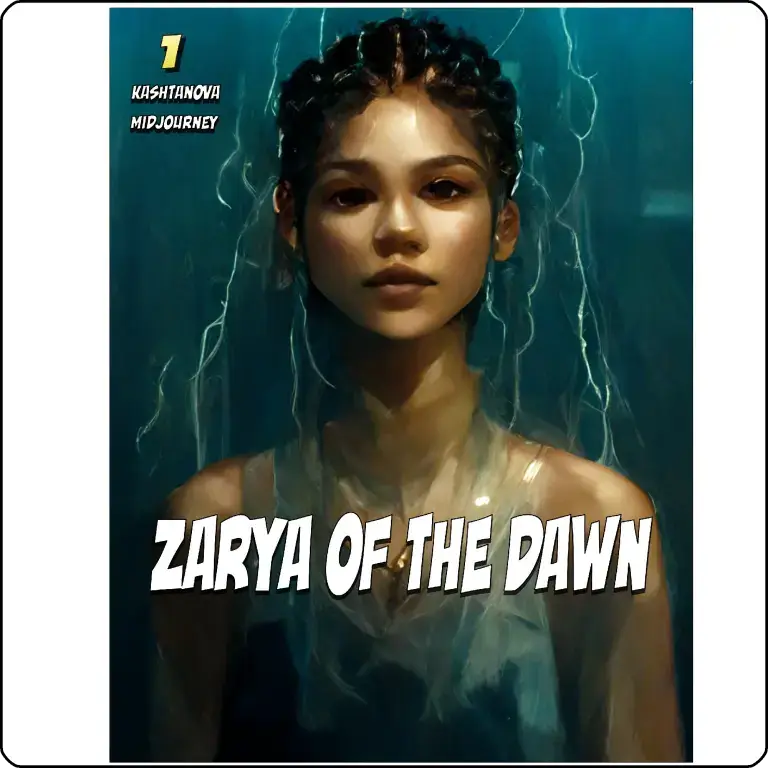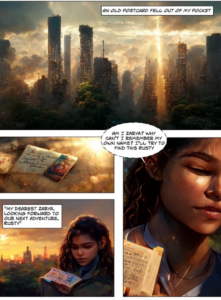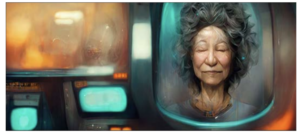There are a number of computer programs and websites that will allow you to create an image using artificial intelligence. One of them is Midjourney. You can see some of the Midjourney AI-generated art here.
Kris Kashtanova used Midjourney’s generative AI tool to create a comic book titled Zarya of the Dawn. She submitted the work to the Copyright Office, seeking registration, and the Office issued the registration in September 2022. However according to the Copyright Office Ms. Kashtanova did not disclose that she used artificial intelligence to create Zarya.
Soon afterwards the Office became aware – via a reporter’s inquiry and social media posts – that Ms. Kashtanova had created the comic book using artificial intelligence. The Office reconsidered the registration and, after much correspondence and argumentation with Ms. Kashtanova’s attorneys, canceled the registration, concluding that:
. . . the images in the Work that were generated by the Midjourney technology are not the product of human authorship. Because the current registration for the Work does not disclaim its Midjourney-generated content, we intend to cancel the original certificate issued to Ms. Kashtanova and issue a new one covering only the expressive material that she created.
This conclusion is the denouement in a lengthy letter from the Copyright Office analyzing the copyrightability of the images contained in the Zarya comic in detail in light of how Midjourney creates images. In correspondence with the Copyright Office Ms. Kashtanova argued that she had provided “hundreds or thousands of descriptive prompts” to Midjourney to generate “as perfect a rendition of her vision as possible.” However, based on how Midjourney creates images – essentially via a random mechanical process, notwithstanding the prompts of the human “mastermind” – the Copyright Office concluded that she was not the “author” of the resulting images for copyright purposes. The Copyright Office reasoned that “unlike other tools used by artists” (such as Adobe Photoshop), Midjourney generates images using prompts in an “unpredictable way.” “Because of the significant distance between what a user may direct Midjourney to create and the visual material Midjourney actually produces,” Ms. Kashtanova did not have enough control over the final images generated to be the “inventive or mastermind” behind the images.
Here are some takeaways from this decision.
First, artists using generative AI to create images should not assume that they own a copyright in the images. At present the Copyright Office appears firmly committed to its position that they do not, and until there are court decisions to the contrary, or Congress amends the Copyright Act to accommodate these works, the better practice is to assume no protection.
Second, it may be possible to protect an AI-created work based on human modifications to the work. This was illustrated by the Zarya decision, where Ms. Kashtanova also sought registration for images that she created using Midjourney but altered post-production using Photoshop. With respect to one of these images the Copyright Office left open the possibility that copyrightable expression had been added, and therefore the image might receive registration. However, in these cases the burden will be on the human artist to establish that the human modifications or contributions reflect sufficient expression to receive protection. And, the scope of protection would likely be limited to the modifications, not the full image.
Third, this is a fast-moving area of law. Ms. Kashtanova – or any person or company denied registration – has the right to appeal the Copyright Office’s decision to a federal district court, from which the case may go on appeal to a circuit court, or even the Supreme Court. Whether Ms Kashtanova will take that action – or whether we will have to wait for another case – remains to be seen. A court – or Congress by amendment to the Copyright Act – could change the law on copyright protection of AI images.
Lastly, the Copyright Office’s reasoning on AI images is likely to extend to text as well. Thus, if a person uses a program such as ChatGPT to create a written work, it seems unlikely that the Copyright Office would accept it for purposes of registration. Despite the best efforts of the “prompt engineer,” the resulting output is likely to be too random to fall within the Copyright Office’s views of authorship.
Update: On March 10, 2023, less than a week after I published this post, the Copyright Office issued a “statement of policy to clarify its practices for examining and registering works that contain material generated by the use of artificial intelligence technology.” (link). Here is the heart of that policy statement: “In the case of works containing AI-generated material, the Office will consider whether the AI contributions are the result of ‘mechanical reproduction’ or instead of an author’s ‘own original mental conception, to which [the author] gave visible form.’ The answer will depend on the circumstances, particularly how the AI tool operates and how it was used to create the final work. This is necessarily a case-by-case inquiry.”
How this principle will be applied in practice remains to be seen.


